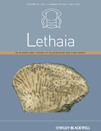
LETHAIA
metrics 2024
Fostering Knowledge in Evolutionary Science
Introduction
LETHAIA, an esteemed journal published by Scandinavian University Press - Universitetsforlaget AS, serves as a vital platform for the dissemination of innovative research in the fields of paleontology as well as ecology, evolution, behavior, and systematics. Established in 1968 and continuing its impactful journey until 2024, LETHAIA has consistently contributed to advancing scientific understanding of Earth's biological and geological history. With a 2023 impact factor placing it in the Q2 category for both Paleontology and Ecology, Evolution, Behavior and Systematics, the journal is recognized for its high-quality, peer-reviewed articles that engage and challenge the academic community. Researchers, professionals, and students alike will find LETHAIA to be an indispensable resource for the latest findings, methodologies, and theoretical advancements in these interlinked disciplines.
Metrics 2024
 0.60
0.60 1.90
1.90 1.80
1.80 65
65Metrics History
Rank 2024
Scopus
IF (Web Of Science)
JCI (Web Of Science)
Quartile History
Similar Journals
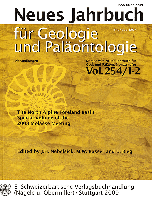
NEUES JAHRBUCH FUR GEOLOGIE UND PALAONTOLOGIE-ABHANDLUNGEN
Unearthing Insights from the PastNEUES JAHRBUCH FUR GEOLOGIE UND PALAONTOLOGIE-ABHANDLUNGEN, published by E SCHWEIZERBARTSCHE VERLAGSBUCHHANDLUNG, is a distinguished scholarly journal based in Germany that has made significant contributions to the field of Earth and Planetary Sciences with a particular emphasis on Paleontology. With its ISSN: 0077-7749, this journal provides an essential platform for researchers, professionals, and students to explore cutting-edge research and developments that enhance our understanding of geological and paleontological processes. Boasting a robust ranking of #67 out of 113 in Scopus for the category of Earth and Planetary Sciences and achieving a Q3 quartile ranking in Paleontology, it stands as a significant resource in the global academic community. Though not an open-access journal, it offers valuable insights from 1987 onwards, ensuring a comprehensive archive of high-quality research articles published from 1995 to 2024. Its scholarly impact continues to resonate, making it a vital reference point for advancements in the ever-evolving disciplines of geology and paleontology.
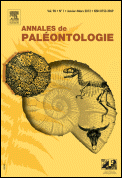
ANNALES DE PALEONTOLOGIE
Where Paleontological Excellence Meets Global CollaborationANNALES DE PALEONTOLOGIE is a distinguished academic journal published by MASSON EDITEUR that plays a pivotal role in the field of paleontology. With an ISSN of 0753-3969 and an E-ISSN of 1778-3666, this journal has been a vital resource since its inception in 1988, continuously contributing to the advancement of knowledge in Earth and Planetary Sciences, particularly focusing on paleontological research. Currently ranked #68 out of 113 in its category by Scopus, and celebrated for its Q2 quartile standing, ANNALES DE PALEONTOLOGIE publishes innovative studies, reviews, and discussions that appeal to a diverse audience of researchers, professionals, and students. The journal aims to foster a deeper understanding of paleontological phenomena and encourages interdisciplinary collaboration within the scientific community. Although it is not an open access journal, its commitment to scholarly excellence ensures that the content is highly regarded and widely referenced in academic circles. Situated in Issy-les-Moulineaux, France, it continues to maintain a global readership while promoting significant advancements in paleontological research.
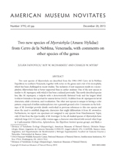
AMERICAN MUSEUM NOVITATES
Elevating Understanding: Insights from the American Museum of Natural History.AMERICAN MUSEUM NOVITATES, published by the American Museum of Natural History, stands as a prestigious platform for scholarly dissemination in the fields of Archeology, History, and Museology. With an impressive impact factor evidenced by its Q1 rankings in 2023 across these categories, this journal is a vital resource for researchers and professionals seeking to advance knowledge and understanding within these disciplines. The journal's commitment to quality research is reflected in its high rankings within Scopus, where it boasts a remarkable rank of #37 in History and #4 in Museology, showcasing its relevance and influence in the academic community. While open access options are not currently available, readers can access compelling research articles that span from its inception in 2005 to the present date, making it an essential reference for those interested in the historical and cultural implications of natural history and museum studies. Located in the heart of New York, this journal fosters a collaboration between scientists and scholars, enriching both academic and public understanding of our shared heritage.

NAUTILUS
Exploring the Depths of Aquatic KnowledgeNAUTILUS is a distinguished journal published by the Bailey-Matthews Shell Museum, dedicated to advancing the understanding of aquatic sciences as well as ecology, evolution, behavior, and systematics. With an ISSN of 0028-1344, NAUTILUS has played a significant role in the scholarly community from its inception, with publication converged between 1996 to 2015 and 2017 to 2024. Although currently categorized as Q4 in Aquatic Science and Ecology, Evolution, Behavior and Systematics for 2023, the journal has a reputation for publishing high-quality research that contributes to the broader scientific discourse. Researchers and students alike can benefit from the insights provided by NAUTILUS, which remains committed to exploring the intricate relationships within aquatic ecosystems. Its editorial management, led by Dr. José H. Leal, ensures rigorous peer review and academic excellence, making it a crucial resource for those dedicated to discovering the complexities of aquatic and ecological research.
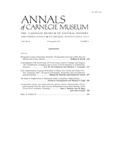
ANNALS OF CARNEGIE MUSEUM
Advancing Knowledge: Insights into Ecology, Evolution, and GeologyANNALS OF CARNEGIE MUSEUM, published by the Carnegie Museum of Natural History in the United States, stands as a significant forum for scholarly research in the fields of Ecology, Evolution, Behavior, Systematics, and Geology. With an established history from 1990 to 2024, this journal caters to the scientific community by fostering the dissemination of high-quality, peer-reviewed articles that enhance our understanding of Earth's biological and geological processes. Notably recognized in the 2023 category quartiles, the journal ranks in Q2 for both Ecology and Geology, showcasing its importance and relevance in these disciplines. Although it currently does not offer open access options, the journal's rigorous editorial standards and impactful research, evidenced by its Scopus rankings, make it an indispensable resource for researchers, professionals, and students aiming to contribute to the advancing knowledge of natural history. The ISSN 0097-4463 and E-ISSN 1943-6300 facilitate easy access to its comprehensive archives, ensuring that vital insights into the natural world are readily available for ongoing scholarly exploration.
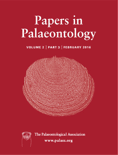
Papers in Palaeontology
Advancing Knowledge in Evolutionary HistoryPapers in Palaeontology, published by WILEY, is a premier academic journal dedicated to advancing the field of paleontology. With an admirable impact factor and positioned within the Q1 category in Paleontology for 2023, this journal has established itself as a leading platform for innovative research and discussion, ranking 17th out of 113 in Scopus’s Earth and Planetary Sciences category. Since its inception in 2015, Papers in Palaeontology has aimed to publish high-quality, peer-reviewed articles that explore the diversity of ancient life forms and their evolutionary history. Researchers, professionals, and students alike will find valuable insights and rigorous analyses that contribute to the understanding of our planet’s past. Although Open Access options are not available, the journal provides a wealth of knowledge essential for anyone engaged in the study or practice of paleontology, solidifying its importance in shaping future academic discourse.
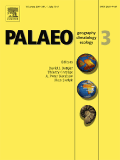
PALAEOGEOGRAPHY PALAEOCLIMATOLOGY PALAEOECOLOGY
Advancing Insights into the Interconnectedness of Earth’s HistoryPalaeogeography, Palaeoclimatology, Palaeoecology, published by Elsevier and accessible via ISSN 0031-0182 (print) and E-ISSN 1872-616X (online), stands as a pivotal journal in the fields of Earth-Surface Processes, Ecology, Evolution, Behavior and Systematics, Oceanography, and Paleontology. With an impressive Impact Factor and ranking in the top quartile (Q1) across multiple categories, this journal facilitates cutting-edge research that explores the intricate relationships between past climates, environments, and ecosystems. Its scope encompasses a wide array of studies focusing on the geological and biological records that inform our understanding of contemporary ecological dynamics. Key objectives include advancing knowledge in palaeoecology and enriching discourse around climate change through rigorous research contributions. The journal's dedicated commitment to publishing high-quality, peer-reviewed articles makes it an invaluable resource for researchers, professionals, and students alike, providing insights essential for probing the factors shaping our planet's history. Positioned in the Netherlands and continuing its tradition of excellence since 1965, the Palaeogeography, Palaeoclimatology, Palaeoecology journal remains at the forefront of interdisciplinary research that bridges the past and future.
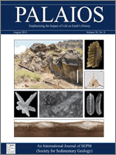
PALAIOS
Innovating Research at the Intersection of TimePALAIOS is a renowned journal published by the SEPM-Society for Sedimentary Geology, focusing on the interdisciplinary fields of paleontology and sedimentary geology. Established in 1986, this scholarly publication serves as a vital platform for disseminating innovative research and insightful reviews that bridge ecological and evolutionary aspects with paleontological studies. With an impressive track record, the journal has achieved a commendable impact factor and consistently holds a Q2 ranking in both Ecology, Evolution, Behavior and Systematics and Paleontology as of 2023. Researchers and professionals will benefit from the diverse range of studies presented, which encompass fossil analysis, stratigraphy, and the impacts of climate change on past ecosystems. By being at the forefront of research and education in these fields, PALAIOS not only enhances comprehension of historical biodiversity patterns but also informs contemporary ecological theories.

REVISTA BRASILEIRA DE PALEONTOLOGIA
Connecting Scholars to the Rich Tapestry of Earth's HistoryREVISTA BRASILEIRA DE PALEONTOLOGIA (ISSN: 1519-7530, E-ISSN: 2236-1715) is a premier academic journal dedicated to the field of paleontology, published by the esteemed SOCIEDADE BRASILEIRA DE PALEONTOLOGIA. Operating under a Q3 quartile ranking in the 2023 Scopus statistics for Paleontology, this journal serves as a vital platform for researchers, professionals, and students to disseminate and engage with cutting-edge discoveries and methodologies in paleontological studies. With a broad scope that encompasses various aspects of Earth's historical life, REVISTA BRASILEIRA DE PALEONTOLOGIA provides an essential resource for the scientific community, particularly those based in Brazil and South America. The journal is committed to promoting rigorous research and fostering collaboration among scholars, ultimately contributing to advancements in the understanding of past biodiversity and extinction events. Its thoughtful curation of articles since 2010 ensures that it remains at the forefront of paleontological scholarship, despite its limited HIndex and open access options. This journal is a crucial asset for anyone looking to deepen their understanding of evolutionary processes that have shaped our planet.
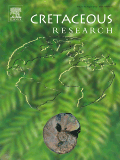
CRETACEOUS RESEARCH
Unearthing the Secrets of the Cretaceous EraCRETACEOUS RESEARCH, published by Academic Press Ltd - Elsevier Science Ltd, is a leading journal in the field of Paleontology that has established itself as an essential resource for researchers and professionals delving into the rich tapestry of the Cretaceous period. With its ISSN 0195-6671 and E-ISSN 1095-998X, this journal boasts a prestigious placement in the academic landscape, holding a Q1 rank in the 2023 Paleontology category and proudly positioned at 21st out of 113 in the Scopus ranking, reflecting its impact factor that places it in the 81st percentile. Since its inception in 1980, CRETACEOUS RESEARCH has facilitated a deeper understanding of prehistoric life and its evolutionary processes, covering topics such as fossil discoveries, paleoecology, and biostratigraphy. This journal best serves those seeking to expand their knowledge and contribute innovative findings to the scientific discourse surrounding the Cretaceous era. As it continues to converge into the future until 2025, it remains dedicated to providing an open platform for the dissemination of high-quality research that shapes our understanding of Earth’s geological past.